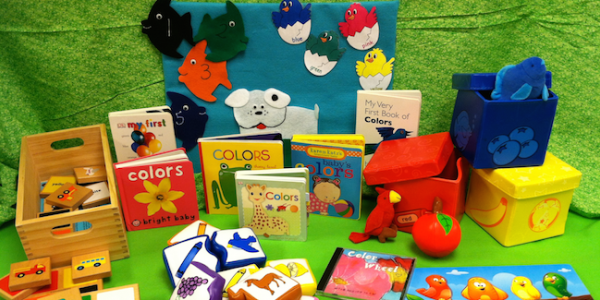Check it Out: Partnering with Libraries to Extend Learning in the Early Years

Today’s public libraries are so much more than books—one of their major missions is supporting early literacy and learning, making library staff perfect partners for early educators and child care providers. Libraries, especially Family Place Libraries™, offer early childhood educators and child care providers a plethora of resources that help build an integrated, comprehensive network of community support and early learning opportunities for families with young children. Family Place Libraries™ are centers for early childhood information, parent education, emergent literacy, socialization, and family support. It is a national initiative with 400 sites in 29 states. Expanding the traditional role of children’s services, Family Place builds on the knowledge that good health, early learning, parental involvement, and supportive communities play a critical role in young children’s growth and development.
Today’s libraries offer early childhood educators access to a variety of services:
- A vast array of free materials including books, manipulatives, puppets, toys, DVDs, and digital media that support curriculum for young children of all abilities and those speaking languages other than English
- Professionally prepackaged kits of early literacy and STEAM materials and hands-on activities for use in classrooms and child care settings
- Librarian expertise to connect you to just the right materials, programs, and services to enhance your lesson plans
- Information and referral to library and community services (i.e., early intervention, parenting support groups, ESL, citizenship, computer classes) that you can share with your families
- Onsite visits to your child care or classroom setting tailored to meet your group’s specific interests and needs
- Many libraries offer free delivery of materials to your center
- Local field trip destinations
- Guest speakers on a variety of topics for parents, professional groups, and early childhood conferences
- Organizational expertise in planning and implementing joint programs and events
All of these benefits and more are available through many of your local community libraries. Developing a relationship with library staff is the first step in cultivating meaningful partnerships between your school or organization and the library. Successful relationships are built on trust, mutual respect, and knowledge and understanding of partners.
Below are some tips for working with your local librarian.
Getting started
- If you don’t already know, find out which library serves the community your school or child care center is located in. Your local school district or town website often posts this information.
- Check out the library’s website to gain some basic information on what it offers, what geographic area it serves, and how to get a library card.
- If you live in a different library district than the one in which your school is located, make a point to also visit your home library.
- You can borrow children’s materials from your home library for use in your classroom as well as materials for your professional development.
Initial contact
Call or email your local library to make an appointment with the children’s librarian for a library tour and to learn about services, collections, and programs available for early childhood teachers or care providers, students, and parents. Some questions you may want to ask are below. Does the library:
- Have an early childhood area on the public floor with toys and interactive materials for infants, toddlers, and preschoolers?
- Have a parents’or teachers’ collection?
- Offer collections and services for children with special needs?
- Have online or printed materials on the early childhood and parenting offerings that you can share with your families?
- Offer special services such as class visits and tours, nursery school fairs, kits, or special collections that can be checked out?
- Offer programs onsite at early childhood schools and care centers?
- Provide professional development workshops on storytelling or book sharing techniques for your staff and parents?
- Provide outreach to ensure local school and child care center students get library cards?
- Have a list of all libraries in the area you can show parents who do not reside in that particular library’s service area?
Build a partnership
Library staff and child care providers bring both strengths and limitations to the table. Both parties may be concerned about limited staff, pressing schedules, and conflicting hours. Addressing issues of concern at the beginning of the partnership helps clear the way for a positive collaboration. Make sure you:
- Take time to get to know each other.
- Talk about local networking opportunities.
- Develop a plan that outlines easy to implement activities and when those activities will take place.
- Set up a meeting schedule if you decide to explore other cooperative ventures.
When early childhood educators and child care providers partner with libraries and librarians, it opens new possibilities and provides increased opportunities that lay the foundation for school success.
Kathleen Deerr is assistant director at the Middle Country Public Library, in Centereach, New York, and national coordinator of the Family Place Libraries™ initiative.
Kristen Todd-Wurm is a youth services librarian at Middle Country Public Library and a national trainer for the Family Place Libraries™ initiative. Kristen holds an MLS from Long Island University.